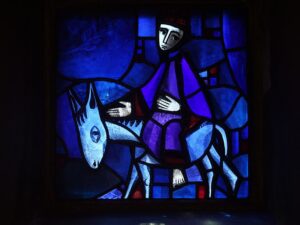
Pope Celestine
When [Pope] Nicholas [IV] died [1292], there was disagreement among the cardinals. Some insisted that the pope should be experienced in worldly matters, a man who understood the intrigues and ambitions of the world; others held to the Franciscan ideal and sought the election of a candidate embodying it. Finally, the latter group prevailed, and Celestine V was elected. He was a Franciscan of the “spiritual wing of the order. When he appeared barefoot and riding a donkey, many thought that the prophecies of Joachim of Fiore were coming true. Now was the age of the Spirit beginning, and the church would be led by the humble and the poor. Two hundred thousand hopeful believers went on pilgrimage to greet him…. The famous poet Jacopone da Todi… declared that the hopes of the world were laid on Celestine’s shoulders, and that were he to fail great woes would ensue. And fail he did. Since he knew nothing and wished to know nothing- of the political realities of his time, he soon became a tool of Charles II of Naples, who used the pope to advance his own political agenda. Finally, less than a year after his election, Celestine decided to abdicate after a brief pontificate. He appeared before the cardinals, shed the papal robes, and literally sat on the ground, vowing that he would not change his mind. He then withdrew once again to a strict monastic life, which he led until his death less than five years later…. Celestine was one of the humblest men ever to occupy the throne of Saint Peter.
– Excerpt from Justo L. González’s excellent The Story of Christianity, Vol. 1: The Early Church to the Dawn of the Reformation
González’s recounting of the life of Celestine fascinates me for at least three reasons. First, I empathize with him and wonder if I wouldn’t fail and quit, just like him, under such awful pressures. Philippians 3:7-16, our epistle reading for this Sunday, starts with these words from Paul: “But whatever gain I had, I counted as loss for the sake of Christ. Indeed, I count everything as loss because of the surpassing worth of knowing Christ Jesus my Lord. For his sake, I have suffered the loss of all things and count them as rubbish, in order that I may gain Christ and be found in him….” I can imagine Celestine contemplating this passage frequently upon his return to monastic life.
Second, I wonder if he did what was right and best. I imagine he wondered the same thing during his remaining five years of life. Despite his spectacular failures in the political “intrigues and ambitions” of the world, is it not possible that his love of the Lord, his desire for holiness, his care for the poor could have had a greater impact on the lives of many had he remained in power? But perhaps his own soul would have grown dark and wounded. Perhaps the Lord gave him the courage to step down. It isn’t always easy to know what the best decision is in every situation. Often we are simply called to pray, make a decision, and then trust in the goodness of our High Priest who sympathizes with our weakness (Hebrews 4:15).
 Third, I wonder why he thought it would be a good idea to “appear barefoot and riding on a donkey” to begin his pontificate. I can only assume that he wanted to imitate Jesus, whom he loved. That is of course always a good desire. However, when Jesus rode into Jerusalem on the donkey, he fulfilled the prophecy from Zechariah 9:9. Anyone can ride a donkey into town, but only Jesus could ride in “righteous and having salvation.” As humble as Celestine may have been, as much as he may have wanted to imitate our Savior “humble and mounted on a donkey.” I believe here he might have gone past imitation and slipped into a temptation to be the Savior for the suffering Church and suffering world. At times, we too face the temptation to be the Savior. Thankfully, none of us typically have two hundred thousand hopeful believers swelling up that temptation.
Third, I wonder why he thought it would be a good idea to “appear barefoot and riding on a donkey” to begin his pontificate. I can only assume that he wanted to imitate Jesus, whom he loved. That is of course always a good desire. However, when Jesus rode into Jerusalem on the donkey, he fulfilled the prophecy from Zechariah 9:9. Anyone can ride a donkey into town, but only Jesus could ride in “righteous and having salvation.” As humble as Celestine may have been, as much as he may have wanted to imitate our Savior “humble and mounted on a donkey.” I believe here he might have gone past imitation and slipped into a temptation to be the Savior for the suffering Church and suffering world. At times, we too face the temptation to be the Savior. Thankfully, none of us typically have two hundred thousand hopeful believers swelling up that temptation.
“Christ Jesus has made [us] his own (Phil 3:12)!” Paul knew he wasn’t perfect. Celestine wasn’t perfect. You and I aren’t perfect. But because Jesus has made us his own, we like Paul, can forget what lies behind and strain forward to what lies ahead, pressing on toward the goal for the prize of the upward call of God in Christ Jesus (3:13-14).
John Laffoon
Deacon &
Minister to Youth & Families
Art: Christ Entering Jerusalem – stained glass window in the Community of Taizé
Brother Eric de Saussure (1925-2007)
Image by Sebastian Sigler. CC BY 3.0
